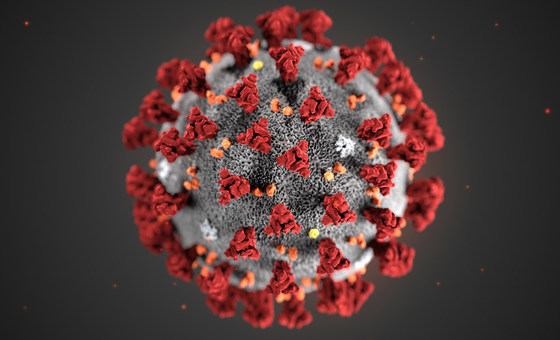Covid-19 and Faith
What do we need to take into account when planning research on Covid-19 and faith? In this blog post, HAD’s Head of Research Dr Jennifer Philippa Eggert argues that we should learn from research responses to previous crises in order to avoid past mistakes.
Risks and opportunities for research on Covid-19
If someone had described the situation we are currently finding ourselves in a year ago, I am not sure I would have managed to keep a straight face. Actually, it is quite likely that I would have burst into laughter … or indulged in a serious roll of the eyes – because clearly they must have watched too many sci-fi films. A killer virus that puts public life on hold? Come on!
But Covid-19 is real, and the impact it has on our societies is real – and that includes those of us who work in research. I left academia almost 1.5 years ago, but I still work in research – now as Head of Research at the Humanitarian Academy for Development. I am still in touch with a lot of my friends and colleagues who work in academia (in addition to new friends and colleagues that I have made from amongst the NGO research community), and it has been interesting to see how they all cope with the Covid-19 crisis in different ways. Some throw themselves into work; some try to work but just can’t; yet others somehow get the absolutely necessary done (which often ends up being teaching, student support and admin – but not research); many struggle to reconcile work and family life. For very few of us, it is business as usual.
At the same time, there is an increasing interest in the Covid-19 crisis, the impact it has on our societies and the responses different states, organisations and individuals have developed – and quite a few emergency funding schemes have been made available.

Learning from past mistakes to prevent harm
It’s not the first time that a major event attracts people’s attention and that substantial amounts of funding are all of a sudden being made available. In some ways, the current situation reminds of the early post-9/11 period, when terrorism studies became the new rage, and within a very short period of time, funding became available, books were being published, calls for papers issued, conferences organised, and careers built. Whilst fascinating research was produced during these early years of terrorism studies, a lot also went awfully wrong – because research was rushed, standards not respected, and people literally became experts overnight (and that is only a slight exaggeration).
The poor research that was often produced as a result had disastrous consequences for a lot of people – and especially people of colour and religion and communities in the Global South, because policy-makers did not shy away from making decisions and shaping policies based on this research. As researchers with an interest in Covid-19 (regardless of whether we work in academia, NGOs or government), we have a responsibility not to repeat these same mistakes and to prevent harm caused by poorly designed, implemented and disseminated research.
I head the Research Department of a faith-inspired organisation, so the following analysis is going to focus on research on Covid-19 and faith and with faith communities, with a particular focus on Islam and Muslims.
1) Acknowledge existing expertise
When terrorism studies started gaining ground in the months and year following the attacks of 9/11 and the ensuing “war on terror” that caused havoc in large parts of the world, studies on non-state violent political groups all of a sudden became a thing. Newly available funding and opportunities attracted lots of researchers who, in some cases, saw opportunity and did not always have the necessary background in the topics they intended to study. In some cases, this led to work being produced that was not always to the highest standards. Terrorism studies is notorious for the tunnel vision that some of its researchers adopt, who rarely engage with neighbouring disciplines, such as conflict studies or area studies. Moreover, the vast majority of terrorism researchers are white, non-Muslim and Western-based. Muslims and people of colour tend to be research objects, with little input into how research agendas are being shaped. To this date, some research publications on terrorism display appalling levels of ignorance of Islamic concepts and Muslim faith practices.
What can we learn from this when it comes to research on Covid-19 and faith? The main lesson here is the importance of acknowledging existing expertise. If the (ground)work has already been done, there is no need to reinvent the wheel – as long as we are receptive to existing approaches, including in neighbouring disciplines. This could take the form of working with established experts on quarantine, social isolation and pandemics – possibly leading to new interdisciplinary approaches. It could mean taking inspiration from how faith actors have responded to earlier endemics. Or it could involve including the very people affected by what we write about – not just as token representatives of their faith, but as the experts that they are – not just as an add-on, but integrated into the entire research process, from research design to dissemination.
2) Consider historic context and local characteristics
One of the major weaknesses of terrorism studies has been a widespread blindness to historic context and local particularities. Of course, there are terrorism researchers who are familiar with the specific context of the countries, regions and communities they are writing about. But especially in the early years of the discipline, publications were often not based on field work, and researchers were lacking the required background knowledge about the history, politics, culture and languages of the people they were writing about. When researching about Muslims and Islam, this sometimes led to research that assumed a universality of faith practices and shared cultural heritage that just does not exist in such simple terms. While Muslims worldwide do share common characteristics, they are not simply the same, and there are considerable difference in how Muslims in Indonesia, France, the US and Syria (to name just a few examples) live their faith, view their religion, and approach life. The ability to distinguish between culture, religion and theology and how the three interact would have been helpful in this regard; however, such nuances were also often lacking in early terrorism studies research.
Similar mistakes can be avoided by ensuring that sufficient background knowledge on the specific context in which Covid-19 plays out is included. The virus has spread globally, but all of us are not affected in the same way. As a comparatist, I often see value in comparative studies, but this should not lead us to overlooking local differences. Covid-19 might be a global phenomenon, but the impact it has on us and the responses we develop are rooted in specific contexts. We should not assume that one perspective, approach or reading applies everywhere, or that historic context or local specifics do not hold meaning any more. Elena Fiddian-Qasmiyeh has discussed this in a recent blog post, in which she highlights the role of historic inequalities in the impact of the coronavirus in refugee camps in Lebanon. If we want to avoid past mistakes, we must take this into account when planning and conducting research on Covid-19 and faith.
3) Adopt intersectional approaches
Terrorism studies as a discipline has long been dominated by men – often white, Western-based, culturally Christian men. In many cases, this resulted in a rather one-sided view of the topics the discipline studied. Gender was often missing in existing analyses – let alone race, faith, class or ethnicity – or analyses that consider the intersection of these factors. To this day, panels on terrorism tend to be dominated by the same group of people – who often tend to be “pale, male, stale” experts… If diversity and inclusion are on the agenda, this often only results in adding white, Western women to the table – rather than making sure that other marginalised groups are represented as well, let alone thinking about more radical approaches to address some of the issues terrorism studies has been plagued with for decades.
Let’s not repeat the same mistake when doing research on Covid-19. The virus affects all of us, no matter where we live and what our experience in life is, and we must take this complexity into account if we want to fully understand the impact of the coronavirus. Existing media analyses and commentaries have pointed to the role of gender, race, class, age, ethnicity, faith and global inequalities – these must also be taken into account when designing, conducting and disseminating research on Covid-19. In the case of research focused on faith and the coronavirus, this could, for example, include looking at how different faith groups have been affected by the crisis, what internal differences there are within a given faith group, what their response has been, how women of different faiths (and none) experienced the crisis, how middle-class Muslims have coped as compared to Muslims with a working class background, how Islamic faith practices were adapted for the very old and the very young … to name just a few examples.
Conclusion
The current crisis is (hopefully) a once in a life-time event for most of us. The last weeks have shown that Covid-19, the impact it has on our societies and our response(s), presents a myriad of research opportunities – at least for those researchers who do have the capacity and resources to conduct research in the current circumstances. However, it is important for researchers (and research funders) not to rush into new projects. Instead, it is crucial to undertake thorough (and honest) assessments first – which look carefully at the question of whether or not a given team are best placed to conduct a specific piece of work, what else has been done in the past, and how we plan to consider the complexity of the phenomena we intend to study.
Follow HAD on Facebook, LinkedIn, Twitter and Instagram
Written by Dr Jennifer Philippa Eggert
Head of Research and Development







